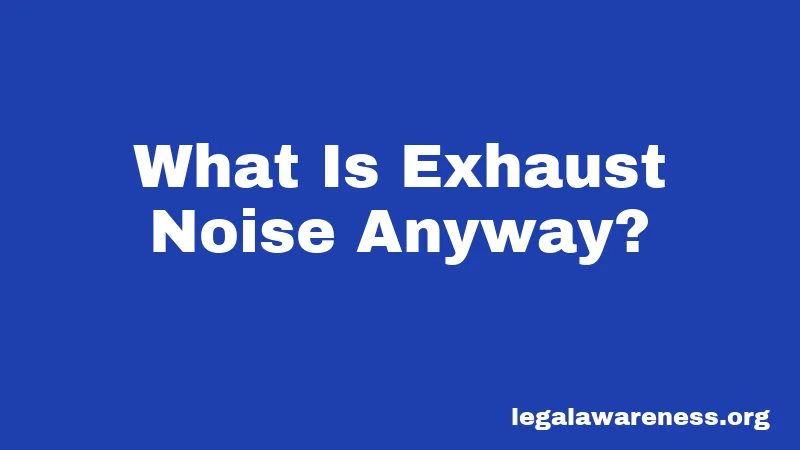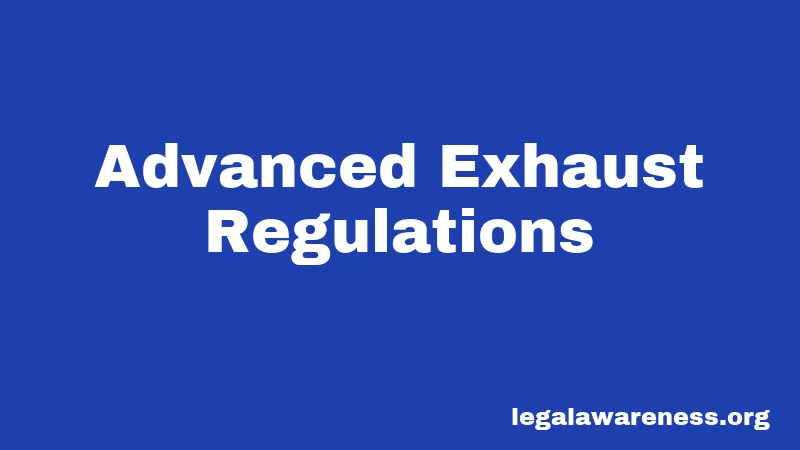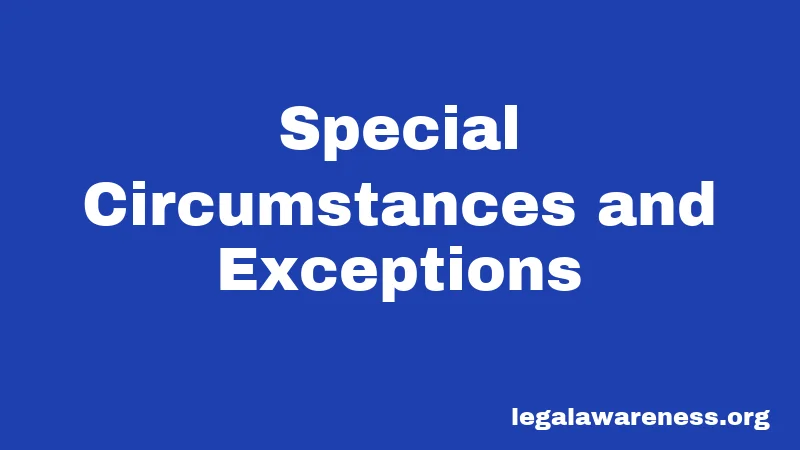Florida Exhaust Laws in 2026: What Your Car Costs You
Most people have no idea this is even illegal. But in Florida, exhaust laws are strict, and the penalties can hit hard. You might think a louder muffler makes your car sound cool. The problem is, the law disagrees. Let’s break down exactly what you need to know so you don’t end up with a hefty fine.
Here’s the thing,Florida takes exhaust noise seriously. Stay with me here. You’re gonna want to know these rules before your next car modification.
What Is Exhaust Noise Anyway?

Your car’s exhaust system does an important job. It releases gases from your engine out the back of your car. A muffler is supposed to reduce the noise that comes out. Right? Pretty straightforward.
When you modify an exhaust system, you’re changing how that works. An aftermarket exhaust, a muffler cutout, a straight pipe—these all make your car louder. Some people do it because they think it sounds powerful. Others want the attention. Here’s the real talk: Florida law says you can’t make your exhaust louder than it came from the factory.
Basic Florida Exhaust Laws
Your Car Must Have a Functioning Muffler
Every car in Florida needs a muffler that actually works. The law is that simple. Your vehicle must have a muffler, manifold pipe, and tailpiping in good condition at all times. And it has to be operating—meaning you can’t disconnect it or use a muffler cutout device on the highway.
What’s a muffler cutout? Think of it like removing your muffler temporarily when you want to hear more noise. Yep, that’s illegal too. You can’t use one on any highway in Florida.
The “Excessive or Unusual Noise” Rule
This is the big one. Florida law says your exhaust can’t make “excessive or unusual” noise. But what does that actually mean? Basically, your car shouldn’t be louder than it was when it rolled off the assembly line. Not sure what counts as a violation? Let me break it down.
Cars made after January 1, 1979 have specific noise limits. Here’s what you need to know: if you’re driving in a 35 mph zone or slower, your exhaust can’t exceed 72 decibels. In zones over 35 mph, the limit goes up to 79 decibels. A decibel is how we measure sound loudness. To give you perspective, normal conversation is about 60 decibels.
If your modified exhaust is louder than the factory original, you’re breaking the law. It doesn’t matter if you think it sounds better. The law cares about the decibel level, not your opinion.
No Muffler Bypasses or Cutouts
Hold on, this part is important. You absolutely cannot use a muffler bypass device on a highway in Florida. A bypass lets exhaust gases skip the muffler entirely, making your car extremely loud. It’s a nonmoving traffic violation. That means you can get cited just for having the device installed, even if you’re parked.
Advanced Exhaust Regulations

Aftermarket Exhaust Systems Are Heavily Restricted
Car enthusiasts often want to upgrade their exhaust systems. The aftermarket performance exhaust industry makes tons of money selling louder systems. But Florida’s law creates real problems for this industry. Here’s why: if the aftermarket system is louder than factory original, it’s illegal. Period.
This one’s probably the most important rule. Honestly, most people get this wrong. They assume that if a shop sells it, it must be legal. Wrong assumption. Just because you can buy something doesn’t mean Florida law allows it on public roads.
Penalties and Consequences
What happens if you break these laws? The answer depends on a few things. Let me spell this out clearly.
First Offense
If you’re caught with an illegal exhaust for the first time, you’re facing a fine. The base penalty is typically around $116 to $313, depending on your county. Some counties charge more than others. The violation goes on your record as a traffic infraction.
But wait, there’s more. If law enforcement can prove you modified the exhaust system, there’s an additional fine specifically for that. You could get hit with an extra $200 fine on top of everything else. So your first offense could cost you anywhere from $300 to $500 total when you add it all up.
Second and Subsequent Offenses
Get caught a second time? Your fines jump dramatically. The extra fine for a second offense is $500. That’s on top of the regular violation fine, which could be another $200 to $313 depending on your county. You’re looking at $700 to $800 minimum.
Think of it like this: it’s similar to getting multiple speeding tickets, but with steeper consequences. The state wants you to fix the problem after your first warning.
Beyond Fines
Here’s something people don’t always realize. You might be forced to get a vehicle inspection. Law enforcement can require you to take your car in and prove it meets noise standards. If it doesn’t, you can’t legally drive it until it’s fixed.
In serious cases or if you have multiple violations, your vehicle registration could be suspended. Your registration is what allows you to legally drive on public roads. Lose it, and you lose the right to drive.
Special Circumstances and Exceptions

What Vehicles Are Allowed to Be Loud?
Okay, pause. Read this carefully. Some vehicles are completely exempt from these noise laws. Here’s who gets a free pass:
Emergency vehicles like police cars, ambulances, and fire trucks are exempt. They need to be heard in emergencies. Any vehicle in a professional or amateur racing event is also exempt. If you’re competing in an official sanctioned race and charging admission, the noise rules don’t apply to you on the track.
Agricultural equipment and construction vehicles are exempt too. A tractor doing farm work or a bulldozer on a construction site can make noise. Manufacturer test vehicles used for engineering and design testing are also allowed to exceed the limits. These are cars being tested by engineers to see how they perform.
But regular street cars? No exceptions. You can’t claim you’re “testing” your car or that it’s a one-time thing.
Local County and City Rules
Wondering if this applies to you? It applies everywhere in Florida. These are state laws, so they’re uniform. No city or county can make their own separate rules on this issue. However, some areas like Collier County have added extra enforcement efforts to catch violators.
In 2024, the Southwest Florida Noise Task Force ramped up enforcement in Collier County. They started issuing citations aggressively and even visiting auto shops to educate mechanics about the laws. This shows that enforcement is getting stricter, not looser.
How to Keep Your Exhaust Legal
Here’s what you need to do to stay on the right side of the law.
Keep Factory Exhaust Systems
The safest option is simple: keep your exhaust system as it came from the manufacturer. Don’t modify it. Don’t replace it with a louder aftermarket system. If you want to upgrade other parts of your car, that’s fine. But leave the exhaust alone.
Get Exhaust Work Done at Legitimate Shops
If something breaks and you need exhaust repair, go to a reputable mechanic. Don’t go to a shop that specializes in “performance exhausts” if you want to stay legal. A legitimate shop will fix your exhaust to meet original specifications, not make it louder.
Know What You’re Buying Before You Buy It
Before you purchase any exhaust parts online or at a shop, ask a simple question: will this be louder than the factory original? If the answer is yes, don’t buy it. It doesn’t matter if the seller says it’s “street legal.” Florida law says it needs to match the original noise level.
Check Your Exhaust Regularly
Honestly, this is the part most people miss. Keep your exhaust system in good condition. Check for rust, cracks, or damage. A broken muffler that lets excess noise through violates the law just as much as a modified one. Get problems fixed immediately.
If you hear your car getting noisier over time, that’s a sign something’s wrong. Get it inspected before you get pulled over.
What If You Currently Have an Illegal Exhaust?
A friend asked me about this last week. Turns out, most people get it wrong. If you currently have an illegally modified exhaust, here’s what happens if you get caught: you get cited immediately. The solution is to fix it. You need to either remove the modification or replace the exhaust system with one that meets legal standards.
Once you fix it, get documentation showing you did. Keep receipts from the repair shop. If you ever get stopped by law enforcement and have proof it’s been corrected, it helps your case.
How Law Enforcement Measures Noise
Sound level meters are the tools police use. They measure decibels from a standard distance (usually 50 feet). Officers can use these devices to test your vehicle on the spot. If your exhaust exceeds the legal limit, you get cited right there.
Law enforcement training includes identification of modified exhausts. Experienced officers can often tell just by looking or hearing a vehicle whether it’s been modified. But the official test is always the decibel measurement.
Frequently Asked Questions
What counts as a “modified” exhaust?
Any change to the original exhaust system that increases noise is a modification. This includes aftermarket performance exhausts, muffler deletions, straight pipes, cutouts, and resonator removals. If the manufacturer didn’t install it, and it makes your car louder, it’s illegal.
Can I modify my exhaust if I don’t drive on public highways?
No. Florida law applies to any motor vehicle “upon the highways of the state.” Even private parking lots that are open to the public count as highways. Your driveway might be okay, but once you drive on any public road, you’re subject to the law.
Do I need a decibel meter to know if my car is too loud?
You don’t need one personally, but law enforcement has them. A good rule of thumb: if your car is noticeably louder than other cars on the road, it’s probably illegal. When in doubt, don’t modify it.
What should I do if I get cited for an illegal exhaust?
First, don’t panic. It’s a traffic violation, not a criminal charge. You have the right to contest the citation. You can request a hearing and present evidence that your exhaust meets legal standards. If you’ve since fixed it, you can show proof of that repair.
Are there any legal ways to make my car sound better?
Technically, you can’t modify the exhaust legally. But you can upgrade other parts of your car. Performance air filters, upgraded spark plugs, and engine tuning don’t violate noise laws. You could also save up for a newer car model that sounds the way you want from the factory.
Final Thoughts
Now you know the basics. Florida’s exhaust laws are real, and the penalties are serious. You could pay hundreds or even thousands of dollars in fines, plus your vehicle could be taken off the road. It’s not worth it.
The bottom line: keep your exhaust system stock. If you want performance upgrades, talk to a mechanic about options that don’t involve the exhaust system. Stay informed, stay safe, and when in doubt, look it up or ask a lawyer. Your wallet will thank you.
References
- Florida Statutes Section 316.272 – Exhaust systems, prevention of noise: https://florida.public.law/statutes/fla._stat._316.272
- Florida Statutes Section 316.293 – Noise abatement device: https://codes.findlaw.com/fl/title-xxiii-motor-vehicles/fl-st-sect-316-293/
- Florida Statutes Section 403.415 – Motor Vehicle Noise Prevention and Control Act: https://www.flhouse.gov/Statutes/2025/0403.415/
- Florida Department of Environmental Protection Motor Vehicle Noise Standards: https://www.dep.state.fl.us/
- Southwest Florida Noise Task Force Enforcement Details: https://www.gulfcoastnewsnow.com/article/southwest-florida-noise-task-force-cracking-down-on-illegally-modified-mufflers/61476645
- OPPAGA Report 23-04: A Review of Exhaust System Noise Enforcement: https://oppaga.fl.gov/Documents/Reports/23-04.pdf
